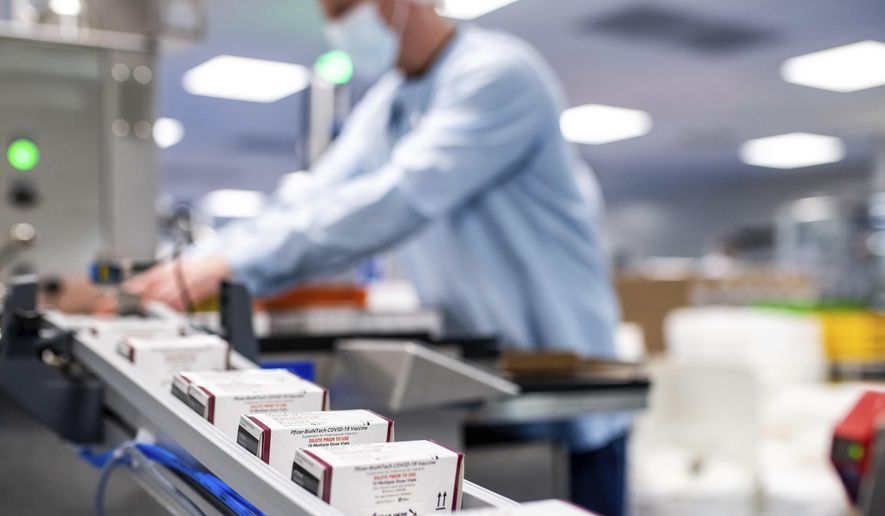Centers for Disease Control and Prevention Director Rochelle Walensky this past weekend approved Moderna and Pfizer-BioNTech’s COVID-19 vaccines for use in American children as young as 6 months.
The decision allows, for the first time, children under five years old to be vaccinated against COVID-19.
“Together, with science leading the charge, we have taken another important step forward in our nation’s fight against COVID-19,” Ms. Walensky said in a statement Saturday. “We know millions of parents and caregivers are eager to get their young children vaccinated, and with today’s decision, they can.”
President Biden praised the approval as “a monumental step forward in our nation’s fight against the virus” in a statement Saturday.
“For parents all over the country, this is a day of relief and celebration,” Mr. Biden said. “As the first country to protect our youngest children with COVID-19 vaccines, my Administration has been planning and preparing for this moment for months, effectively securing doses and offering safe and highly effective mRNA vaccines for all children as young as six months old.”
Parents can begin scheduling vaccination appointments for their children this coming week, the White House said.
A panel of advisers to the CDC voted unanimously earlier Saturday to recommend authorization of the two vaccines for young children.
The Food and Drug Administration approved the shots for emergency use in children as young as 6 months on Friday.
Regulators approved shots from Pfizer-BioNTech for persons aged 6 months through 4 years. Previously, the company’s vaccine was available to those 5 and older.
The FDA authorized Moderna’s vaccine for persons aged 6 months through 17 years, expanding the use of the drugmaker’s vaccine beyond adults.
The decision caps a lengthy wait for parents who were eager to vaccinate their youngest children. They say providing some level of protection against severe disease will help them pivot to normal activities.
FDA Commissioner Robert Califf vouched for the shots’ safety and said they will provide protection against the worst outcomes, such as hospitalization and death. Federal officials say there have been 30,000 COVID-19 hospitalizations and nearly 500 deaths in the 0-to-4 years old age group.
“Those trusted with the care of children can have confidence in the safety and effectiveness of these COVID-19 vaccines and can be assured that the agency was thorough in its evaluation of the data,” Dr. Califf said.
Pfizer proposed a three-dose regimen for children ages 6 months to 4 years that uses one-tenth of the adult dose. It released data in May that showed a preliminary efficacy of 80% after the third dose, though it was based on a small sample of symptomatic cases in the trial. A final analysis is pending.
Moderna has proposed a two-dose regimen for children ages 6 months to 5 years that uses one-fourth of the adult dose. It released data in late April that said the shots were 37% to 51% effective against symptomatic infection — a low level that is still on par with what adults would expect against the Omicron variant after two doses.
It is studying the impact of the third dose in children, meaning the drugmaker could catch up to Pfizer’s version and provide similar levels of protection.
Mr. Biden said he expects appointments to ramp up in the days and weeks after the launch.
“We are the first country to protect our youngest children with COVID-19 vaccines, offering safe and highly effective mRNA doses to children as young as six months old,” Mr. Biden said. “My administration secured vaccine doses for America’s youngest children and now with FDA’s authorization, we will begin shipping millions of vaccine doses for kids to thousands of locations parents know and trust—including pediatricians’ offices, children’s hospitals, and pharmacies.”
Uptake could be slow at first. Many parents are in “wait and see” mode and want other families to get the shots first, or don’t think young people will suffer bad outcomes from COVID-19 and might not get their children vaccinated.
Florida Gov. Ron DeSantis, a Republican, said his state will not use any of its resources to promote or distribute the shots. His state is the only one that did not preorder shots for the youngest age group, prompting hospitals and pediatricians to complain they will have to seek the vaccines on their own, causing a delay.
The Florida Chapter of the American Academy of Pediatrics said Friday it is working to find options for families while it pushes Mr. DeSantis to reconsider. The governor said he thinks the risks outweigh the benefits for the youngest kids, so the state will not be involved.
“The vaccine is the best resource we have for combatting COVID-19 and, right now, we will not be able to offer this vaccine to our youngest eligible patients when it becomes available,” FCAAP President Lisa Gwynn said. “Parents of young children have been through so much during this pandemic, and they have waited a long time to offer their children this protection. Our phones are ringing off the hook with concerned parents eager to know where they can get the vaccine. Right now, we don’t have a good answer.”
The White House on Thursday said the shots will be available to federally qualified health centers and certain pharmacies in Florida, but pediatricians won’t have immediate access to the vaccines because the state did not order any.
For more information, visit The Washington Times COVID-19 resource page.
• Joseph Clark can be reached at jclark@washingtontimes.com.
• Tom Howell Jr. can be reached at thowell@washingtontimes.com.




Please read our comment policy before commenting.